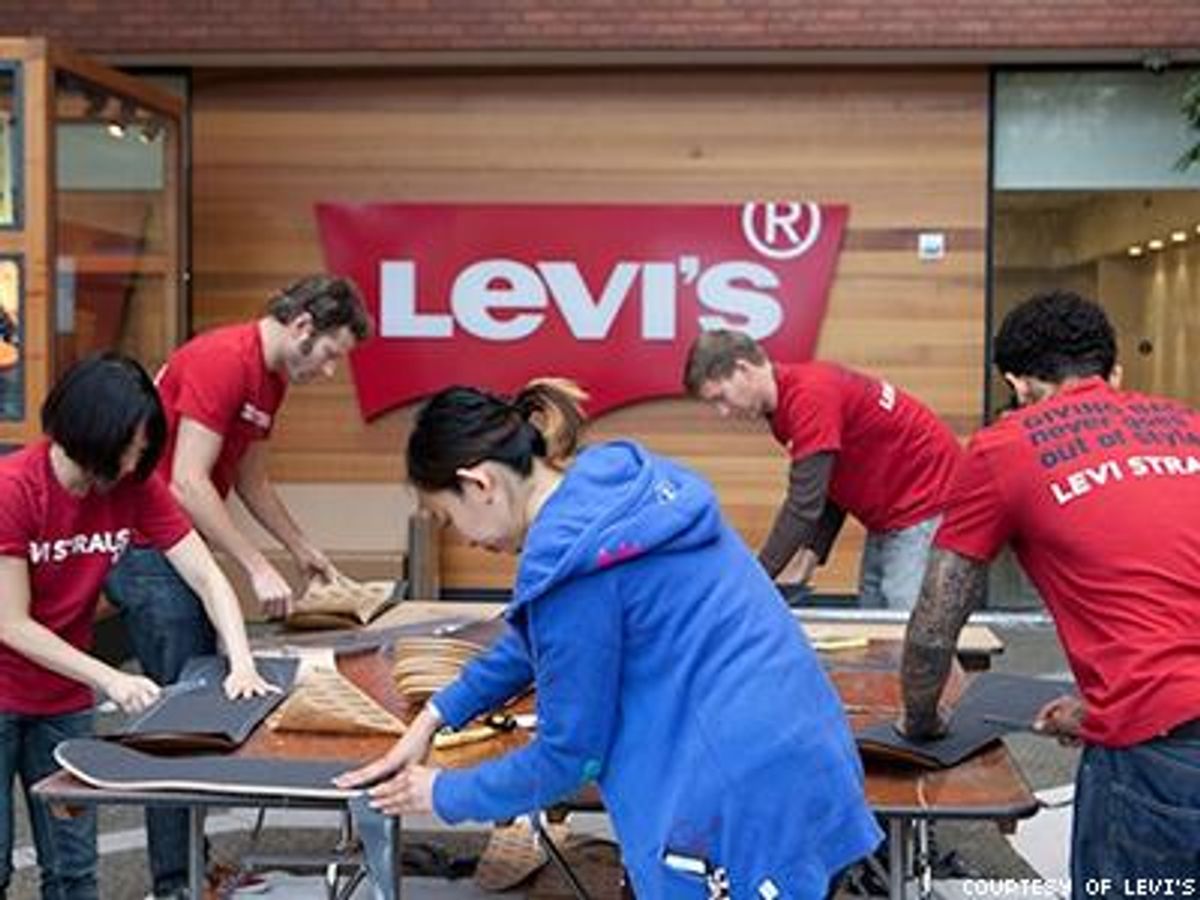What began as a grassroots campaign among Levi Strauss and Co. employees in the early 1980s to raise awareness of HIV and AIDS among their San Francisco colleagues has blossomed into a program largely unparalleled in corporate America today.
For over 30 years, the clothing manufacturer has taken positive steps to address the epidemic inside and outside the company. In addition to Levi’s Worldwide HIV/AIDS Workplace Policy — a corporate policy that not only welcomes and supports HIV-positive employees but also actively fights for their rights — its global Employee HIV/AIDS Program helps employees and their families by providing HIV education, combating
stigma and discrimination on the job, and offering a free 24/7 HIV information and resource telephone line for employees and their families in the U.S.
Even better: Levi’s reimburses employees for the cost of HIV testing, and in places where treatment is not covered by health insurance providers, it covers 100 percent of the cost of HIV treatment, including medications.
Though it started in the ’80s, this employee program became more focused in 2006 as part of a response to the Clinton Global Initiative, with a larger official global company policy and program coming into play.
“This is really, truly a comprehensive program,” says Anna Walker, head of public policy and government affairs at Levi’s. The program works on several levels. First, the policy makes sure that Levi’s employees have access to care and treatment and that the cost is covered, either through insurance or the company’s own funds. Second, the policy addresses stigma and discrimination by educating its employees through HIV and AIDS awareness workshops, which are followed up with surveys to tell if the workshops are improving work environments for poz workers. The company also follows a strict nondiscrimination policy — in every one of the 110 countries where it operates — that lets managers know that any kind of discrimination against employees with HIV will not be tolerated.
The company also addresses the needs of the communities where it operates by working with local AIDS service organizations. Levi’s has worked to increase awareness among its employees and to address HIV issues globally by adapting its policy and goals to local culture, says Walker. Employee education has been a huge success internally, as the number of employees who said in surveys they felt understood and supported in their work environments doubled after HIV awareness training.
“Is it education? Is it prevention? Is it providing care and treatment?” she posits of the company’s success with helping HIV-positive workers. “In some countries there’s really a low level of awareness [of HIV] and certain stigma attached to it, which still needs to be overcome…less so with our San Francisco population.”
Levi’s program, she says, is about “recognizing not one size fits all when you’re talking about a truly global initiative.” For example, while prevention is still part of the program in countries with a high prevalence, such as South Africa, programs also must work harder to focus on testing and encouraging treatment as well as fighting stigma.
In other countries, like Russia, Levi’s may reach out to help organizations working in public health or with women in particular, along with educating employees on their legal rights and dispelling myths about transmission.
The company’s commitment to fighting the HIV epidemic drives it to address these issues even in countries where HIV is not highly prevalent, Walker says. In those areas, she says, it’s still important to raise awareness about discrimination and let employees know about their rights and how to access care.
In addition, the company lobbies on behalf of HIV-positive workers. In 2012, Levi’s president and CEO Chip Bergh joined with over 20 other CEOs in signing a pledge to urge countries to repeal laws that prevent HIV-positive people from traveling freely. The pledge was an initiative of UNAIDS, Levi Strauss, and GBCHealth, a coalition of companies working on global health issues. The effort has seen success, negotiating the end of waiting periods in Hong Kong and Mexico, and removing a preexisting condition exclusion in Taiwan.
The company has also given over $60 million in grants to HIV and AIDS organizations through the Levi Strauss Foundation, which, Walker says, works “hand in glove” with the company’s global employee policy.
“One of the pillars of [the foundation’s] giving is around HIV and AIDS, so there’s a certain level of coordination of what we’re doing internally with employees, and the giving [the foundation] is doing,” she says. “So, making sure grants are being given to organizations in those countries where we need to do more to tackle those misunderstandings, those misperceptions, and those prejudices.”
The company takes its policy seriously, but its employees are just as active in efforts to improve the lives of people living with HIV. Employees volunteer in Community Involvement Teams to organize volunteer days and fundraisers. One of the largest teams is the AIDS Action Group, and it’s these employees who help organize participation in the AIDS Walk.
Walker credits the early leadership of Bob Haas, Levi’s former chairman — and great-great-great grandnephew of the founder — who came out in support of those dealing with AIDS in the earliest days of the epidemic. Haas is widely credited in business circles for creating an ethical workplace where employees are paid well and treated fairly. It was the extension of tradition at Levi’s, a company that integrated its factories in the Deep South during the era of segregation and refused to lay off workers during the Great Depression.
But credit also goes to the grassroots efforts of employees to spread empathy and understanding among the employee base in San Francisco. What began as a small group to address discrimination and misunderstandings around a disease yet to be named has transformed into a global leader of employee support and community outreach around HIV and AIDS.
“It became just a part of what the company was doing since the very beginning,” says Walker.








































































